Welcome to my blog
Grow & Scale A Business That Will Set You Free
The Epic Ravage of CPAD
It was one of those rare summer mornings. Crystal clear; crisp, cool air; soft, gentle light.
My run had been magnificent through the woods and along our meandering river. I luxuriated in the experience of being in my body as it flowed over the ground surrounded by such beauty.
Along the way, I passed a man in his mid-forties walking two substantial dogs. I said, “Good morning.” His head was down. There was no response. 
I looked over my shoulder as I passed. He was transfixed.
By his iPhone.
A sufferer of Continuous Partial Attention Disorder. CPAD.
He is not alone. I’ve had bouts with it myself.
And it has become epidemic.
There are studies that suggest that some folks check their smartphones as many as 900 times a day. We get email alerts and text message alerts and LinkedIn alerts and Facebook alerts and CNBC alerts and weather alerts. Dinging and pinging and competing for our precious, narrow, limited bandwidth.
Folks complain that they don’t have enough time. The truth is that we have all the time in the world. We have the same amount as presidents and kings. We have all the time that there is.
It’s just that we’re not terribly good stewards of it.
CPAD is one of the greatest challenges of our age. It dilutes our focus, degrades our productivity, and damages our relationships.
It causes accidents and mistakes.
More important, it is a thief. It robs us of the only real asset we have, the only time there is: The here and the now.
It steals from us our ability to fully experience the wonder and the beauty of this – this precious moment. Instead, we allow ourselves to stay in a constant state of distractedness and overwhelm.
There are lots of simple ways to treat CPAD. I teach them to our coaching clients. Here are just a few:
• Turn off all of your alerts
• Close your door; silence your phone; create distraction-free space
• Work in blocks of time on just one thing
• Pay attention to just one task, one project, one conversation at a time
• Don’t multi-task; it can’t be done
• Don’t take your smartphone to bed
• Don’t check you email first thing in the morning
Most important, give yourself the space the time to breath each and every day; time to rest, reflect and re-create.
Pay attention, not to what was, not to what might be, but to what is.
Experience the present moment.
CPAD can be eradicated in our lifetimes. But it will take a concerted effort by all of us to make that happen.
What’s Your Destination?
Where are you going? And why?
What is your destination? Will you know it when you get there?
Do you know? Do you remember?
A common question that we ask little kids when we first meet them is, “What do you want to be when you grow up?”
And they know! Teachers, fire fighters, astronauts, doctors, secret agents… they know.
When we’re growing up, we have these grand visions for our lives: what we want to do, where we want to live, how we want to travel, who we want to do it with. They are exciting, compelling visions filled with joy and adventure.
Then one day, we wake up, driving a nice care from the nice suburbs where we live in a nice house with a nice partner to nice work that more or less pays for our nice lifestyles. One day melds into the next, one day the same as the last, over and over again. Until we have forgotten what it was we really wanted in the first place. We lose sight of the horizon. We lose sight of ourselves.
If this sounds familiar, you’re not alone.
Without a vision, the people will perish, Proverbs says. Without a vision, you will perish.
At the very least, you certainly won’t thrive.
You cannot hit a target you can’t see.
- Business growth stagnates unless you know exactly what value you’re bringing to the market place; exactly what problem you’re solving; and exactly who you’re solving it for.
- A career change or job search will most certainly derail unless you know exactly what you want to do, who you want to do it for, and why.
- Your productivity will drop and your stress will skyrocket unless you know exactly what it is that you want to achieve, and why.
When you know your destination,
- Your marketing becomes simpler and far less expensive.
- Your job search will become laser focused
- You’ll get a lot more done in a lot less time
Knowing your outcome – your precise outcome – is key to your success. In everything: Health, wealth, relationships and careers.
I just consulted with a brilliant young professional with an impressive resume who couldn’t seem to get a job to save his life. When I asked him what he really wanted to do, he hemmed and hawed and bobbed and weaved and hedged. He was sending out resumes into the universe without any clear notion of what it was he really wanted to do. The result was that his energy signature was muddled and confused… and potential employers could smell that like rotting leftovers.
As soon as he got clear – as soon as he reclaimed the vision of what it was he really wanted – he found the job he loved.
An entrepreneur I work with has an exciting new business model for delivering professional services. He hasn’t gotten any traction yet because he doesn’t yet know who his ideal client it. As soon as he does, he’ll be unstoppable. 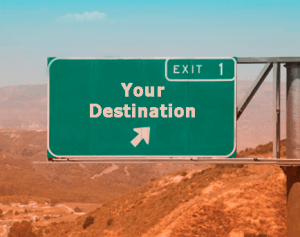
If you don’t have a plan, any plan will do. And that’s the fast track to nowhere in particular.
With a clear vision, you can go anywhere. And life becomes exciting and joy-filled again.
The GPS in your car will take you to within 30 feet of your destination so long as you’ve locked in your coordinates.
Lock in yours today.
Time For A New Map
I was carried away by the sound. Beautiful beyond words. Beautiful beyond anything I had ever heard.
Each note, each passage, more glorious, more magnificent than the last
A soaring concerto.
A virtuoso violinist.
I was the commencement speaker at a high school music academy. And this – this masterpiece – was the evening’s prelude… played by a graduating senior.
I leaned over in my chair on the stage and whispered to the assistant director sitting next to me. “What music school is he going to?”
She frowned and rolled her eyes. “He’s not. His parents want him to study economics.”
I was stunned. And sad.
What the world would never hear.
Even more, I knew how the story would unfold.
You see, many of my clients seek me out for career coaching. Quite a few of them are in their 30’s although some are in their 40’s or 50’s. They’ve gone to great colleges, graduating at the top of their classes (and have a lot of debt). They’ve gone on to graduate school, business school or professional school… and excelled. They’ve landed the plum job with a great salary… and a lot of prestige.
And they’re miserable. They hate their lives. They don’t know how they got to where they are. They can’t figure out how to break free.
They don’t have a clue as to where they lost the path, where they lost their way. 
For the young violinist, it was the moment he walked off the stage.
Because he had the wrong map.
In a recent article, Dick Bolles, career guru and author of the ten million copy best seller What Color Is Your Parachute says that following your dreams still matters; love still matters; love of what you do.
Benjamin Bloom at the University of Chicago studied 120 athletes, artists and scholars in order to determine the ingredients of greatness. He controlled for intelligence and family background and all sorts of variables… and what he discovered was that there was only one common denominator for greatness: extraordinary drive.
Extraordinary drive fueled by passion.
“A musician must make music, an artist must paint, a poet must write if he is to be ultimately at peace with himself,” said Abraham Maslow.
I asked a coaching client today how he ended up a lawyer rather then pursuing the graduate studies in philosophy that he so loved.
“People told me that I needed to be realistic,” he said.
Too many parents, following a well-worn map and pressured by cultural expectations, push their young adults into a college paradigm that is economically broken, into hollow, empty fields that masquerade as ‘real’ jobs , only to end up seeing them unemployed, in debt and living in their basements. Or worse, to see them on my doorstep – after the years have dulled their eyes and sucked their souls – empty, sad and lifeless.
Despite our best intentions, it is a map that leads to nowhere good.
Those who read me often know that I am passionate about life-long learning and about success.
But if you’re going to climb that ladder of success, you better make pretty damn sure it’s against the right wall.
And the only way to do that is to start from a place of love.
Deep love.
R U A Zombie?
Ann and I saw the movie World War Z last summer. It’s about a pathogen gone wild that turns folks into zombies.
Once infected, their eyes glaze over. They become dull and lifeless until they’re stressed by sound. Then they become dangerously aggressive running wildly in packs.
They’re the ‘un-dead.’
But they might as well be dead.
Are you a zombie?
I’ve just started working with a professional who puts in 17-hour days, seven days a week. He doesn’t know how to stop. He has hasn’t taken a vacation in years. His health is failing. His marriage is suffering. And, despite all the time he spends, his business is unraveling.
He’s stressed and lifeless and running around madly; trying desperately to keep all the balls in the air.
He’s definitely a zombie.
But he’s not alone.
So many of the folks who seek out Ann and me for coaching have lost control of their time; they’ve lost sight of their boundaries; they wake up every day feeling exhausted and depleted; feeling as if they’re already behind; then they run around madly all day long trying desperately to accomplish enough – to be enough; then they fall into bed at the end of the day feeling worn out and frustrated and empty… only to wake up and do it all over again. 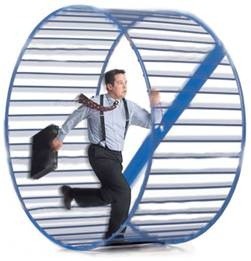
The answer, they think, is to double down. Get busier; work harder; put in more hours.
I know. I owned that tee shirt once. (I had a secretary years ago who referred to me – not so lovingly – as a ‘hamster on a wheel.’ And truth be told, it felt just that way.)
But there is a better way. And it’s not about doing more or accomplishing more or being more.
(In fact, we are already enough, just as we are.)
• It’s about getting clear about our purpose; about our vision for our lives.
• It’s about saying ‘no’ to what’s not working so that we can say ‘yes’ to what is.
• It’s about foregoing the urgent for what is truly important.
It’s about discovering work that makes our hearts sing. It’s about nurturing the relationships that matter. It’s about caring for these magnificent bodies that carry us on this journey.
It’s about resting and recharging and reclaiming ourselves.
Peak performers: They know the secrets:
They know it’s not about working harder.
They’re they ones whose lives are rich and full and happy; who wake up every day excited and on fire about what lies ahead.
They’re the ones who know the rhythms of work and rest and play. They’re the ones with the light in their eyes and the spring in their step.
You can learn these secrets too.
Zombies. They should stay in the movies.
____________________________________________________
This is an encore of a post first published July 25, 2013.
KISS
Why do so many of us have a love affair with the iPod™, the iPhone™, the iPad™?
Because Steve Jobs believed so passionately in elegant simplicity.
“Simplicity is the ultimate sophistication,” Jobs said.
“Simple can be harder than complex: You have to work hard to get your thinking clean to make it simple. But it’s worth it in the end, because once you get there, you can move mountains.”
Simple is powerful. Simple is good.
And yet, for so many folks, complex is their place of default.
We see it frequently among our coaching clients when they confront business challenges. They immediately want to:
• Add personnel
• Build out infrastructure
• Supplement their technology
• Create more layers
Now, there’s nothing intrinsically wrong with leverage or growth. The problem is the potential for the complexity they cause.
Small businesses and solopreneurs often have great advantage over larger enterprises because they are more efficient, fleeter of foot; more able to bob and weave and adapt to change.
They’re clearer about their visions, their missions, and the problems they solve.
They can craft their cultures and engage their teams more mindfully.
They’re more deft at nurturing passion and focus, which brings with it clarity of outcome.
Larger organizations, because of structural constraints like committees and policies and procedures, have the propensity to be less creative, more cumbersome, and rote.
And with layers and structure come fixed cost and overhead.
With big, the business model can become complicated. You need to be able to describe your business to your 8th grade daughter or your nephew in a way that he or she can understand it. Because, if they can’t understand it, how will your customer?
Big, too, can become confusing in terms of mission and purpose. As a business grows, it becomes harder to convey and sustain the founding vision, the original passion, and the fundamental cultural values.
Effecting change in a large complex enterprise, especially in times of crisis, can be like turning a supertanker from the crashing waves of a reef: laborious and slow and fraught with danger.
Big can also take on a life of its own, which may be good if you’re planning successive generations of management; or are creating a model for passive income; or are growing your business to sell it But if you envision wanting to escape someday, big may not be so good. One surgeon that I know would love to retire; but he has no clue how to disentangle himself from the equipment leases, the machinery, the phone systems, the layers of personnel and the crushing burden of malpractice insurance. He is a prisoner in his business, a hostage to the hungry “monster” he has built.
Often one of the fundamental reasons that business fail, according to Jim Collins, author of the business classic Good to Great, is because of “the undisciplined pursuit of more.” Greg McKeown, author of the recent best seller Essentialism, suggests that, in the alternative, success comes from “the disciplined pursuit of less.” 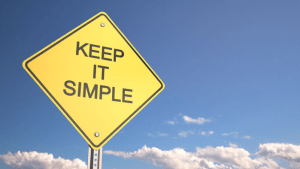
So next time you hit a speed bump, instead of automatically seeking to add something to the mix, why not ask instead,
• What should I be doing less of?
• What should I eliminate?
• What should I make simpler and easier?
Simple became an obsession for Jobs. It’s not a bad one to have.
DOWNLOAD your FREE BOOK!
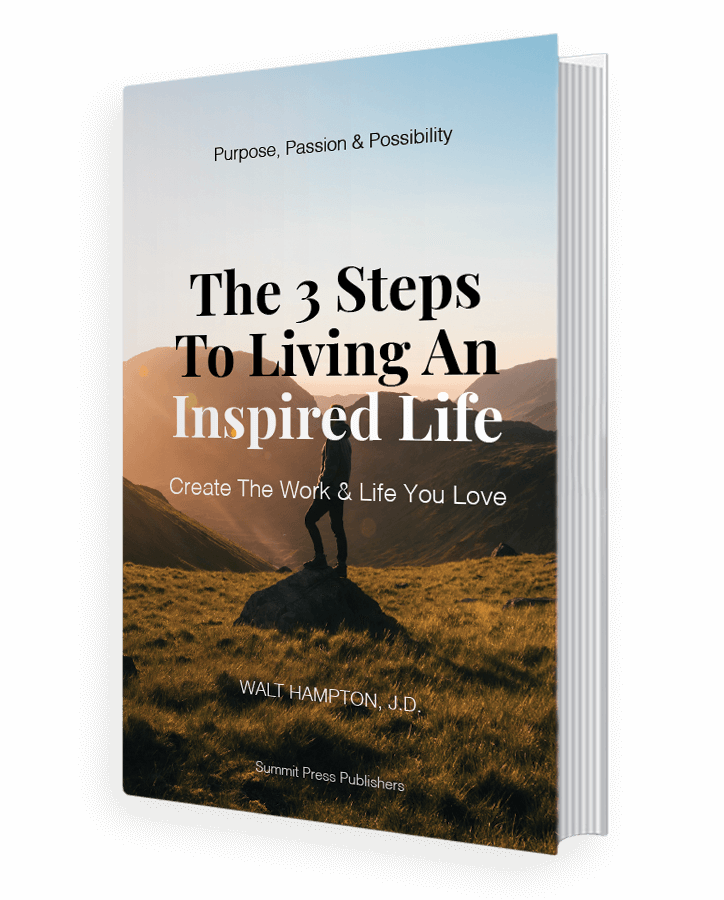
DOWNLOAD Your Free E-Book NOW! Click Below And Get Going!
Click below for your copy of Journeys!
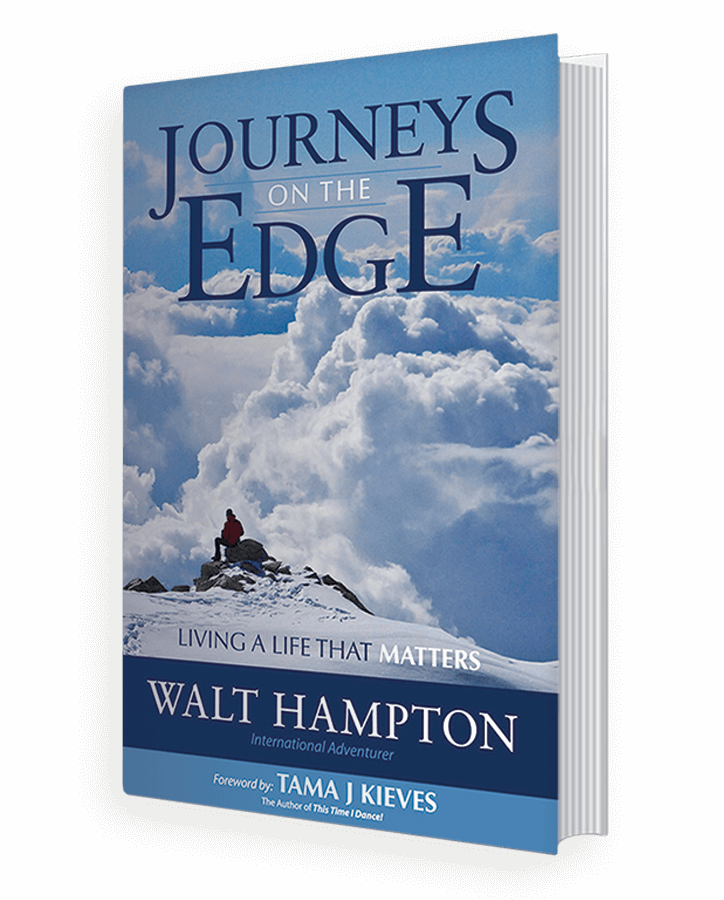
You’ll Get A Signed Copy!
Click on the button for your copy of my brand new book “The power principles of time mastery!”
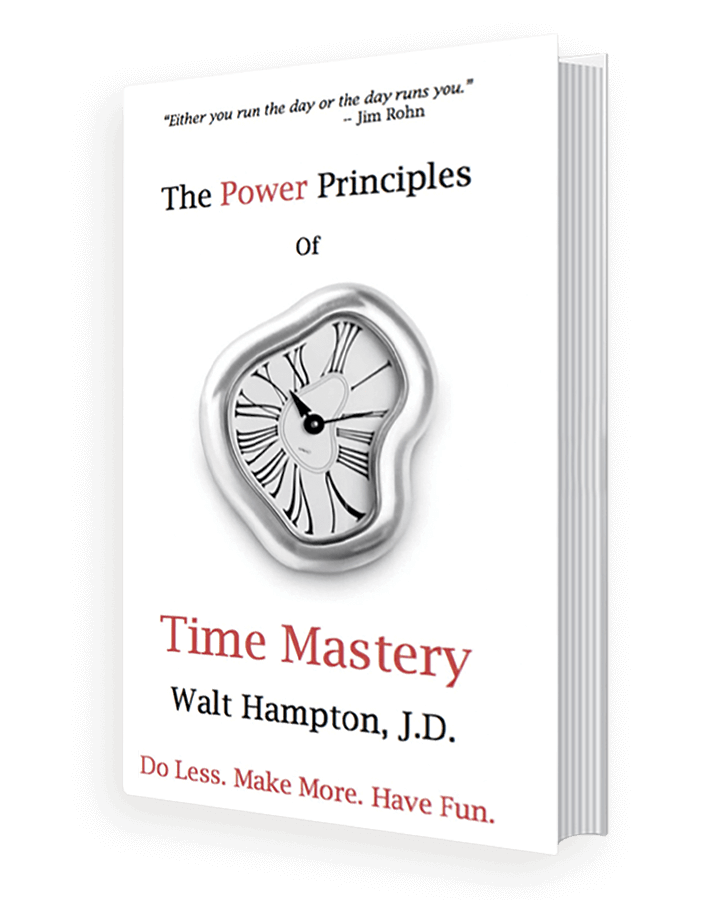
You’ll Get A Signed Copy!
Categories
Adventure
Finding The Way
Journeys
Leadership
Success
Ultra Training
